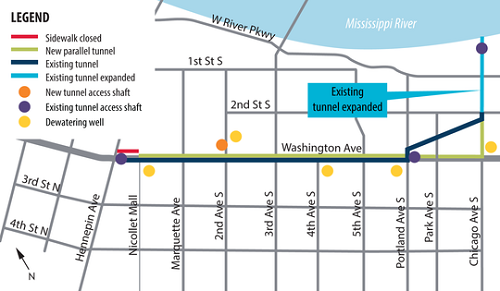
Hotel Ivy, 201 S 11th Street, has announced an extensive, multi-million-dollar renovation by Whitespace Interiors. Phase one of the transformation is now complete and includes renovated guest rooms, meeting and event spaces, and the hotel’s new restaurants, Breva Bar & Grill and Masa & Agave. Phase two of the renovation will be finished by early fall and will include newly designed suites, an updated lobby, and a new lobby bar concept, Bar Breva. Hotel Ivy’s renovation not only provides a new level of luxury for visitors from around the world, but it also highlights the property’s dedication to being an integral part of the vibrant downtown Minneapolis community.
 Above and below, a Grand Deluxe King room with Deluxe Bathroom
Above and below, a Grand Deluxe King room with Deluxe Bathroom

 Above, a Superior Room with two queen beds
Above, a Superior Room with two queen beds

Above, the Grand Salon, and below, the welcoming lobby bar


“As the original luxury hotel in Minneapolis, this renovation is focused on reinvesting in ourselves and downtown Minneapolis,” says Mark Maggiotto, General Manager of Hotel Ivy, a Luxury Collection Hotel, Minneapolis. “We are eager to welcome guests to the newly transformed property and allow them to enjoy the innovative and enhanced luxury experiences the property has to offer while immersing themselves in Minneapolis."
MODERN REDESIGN PAYS HISTORICAL TRIBUTE
Whitespace Interior’s design was inspired by the iconic building itself and the striking contrast between the elegance of the interiors and the rigid, historical ziggurat architecture of the city’s past. Hotel Ivy, a Luxury Collection Hotel, Minneapolis is a property that defines the destination and builds upon the history of the city with its preservation of the original Ivy Tower, which dates back to 1930. The transformation creates a blend of modern luxury while acknowledging the building’s historical past.
“Whitespace Interiors was honored to reimagine this Luxury Collection property,” says Michael Dalton, Managing Principal of Whitespace Interiors. “It was a privilege to work in Minneapolis and encapsulate the city’s unique charm through the property’s interiors for guests and locals alike to enjoy for years to come.”
All guest rooms and suites are now lighter and brighter with high-end furniture, thoughtful finishes, and residential touches. The color palette is composed of luxurious creams, greens, blues, and traces of blush, each drawing inspiration from nature. The exaggerated headboard wall features a custom, nature-inspired mural, and abstract artwork designed by Whitespace Interiors is set in an ornate, gilded frame to add a luxurious juxtaposition. The artwork is heavily inspired by the local lakes and parks for which Minneapolis is renowned. Elegant, inviting bar carts replace traditional minibars, and offer a curated selection of local products including small batch, handcrafted chocolates from Groveland Confections. Public spaces, including the third-floor meeting and pre-function rooms, have been revitalized with a fresh look and feel.
ELEVATED DINING AND DRINKING EXPERIENCES
The hotel’s restaurant spaces have been redesigned and opened by the acclaimed hospitality group, Apicii. The Whitespace Interiors team crafted two distinct designs for the restaurants, each reflecting the individual atmosphere and menu of the establishment while maintaining a cohesive and authentic connection to the aesthetic of Hotel Ivy, a Luxury Collection Hotel, Minneapolis.
On the ground floor, Breva Bar & Grill is a neighborhood restaurant serving New American cuisine and craft cocktails inspired by the flavors of the Midwest. Dishes are made with high-quality ingredients that pay tribute to the region and beyond. Notable customer favorites include Suyu Honey Chicken Wings with roasted peanuts and Brick Chicken with wild rice, rainbow carrots, wilted greens, and mission fig jus. Breva has an extensive wine program focused on popular New and Old-World varietals.
Underground, Masa & Agave is a bustling speakeasy-style bar and cantina with regionally inspired Mexican food. A collection of over 300 agave spirits showcases the craftsmanship of Mexico’s distillers and diverse agave distilling regions. The menu offers a selection of sharable starters such as Tuna Ceviche with chili de arbol, avocado and dill, Mexico City-style street tacos including Beef Birria with braised beef, consume, queso chihuahua and elevated mains including Tablones, Negro Modelo-braised beef short rib and lime. Each dish showcases the culinary heritage and rich flavors of Mexico with Masa & Agave’smodern spin. Additionally, a robust calendar of nightlife programming is offered weekly, Thursday through Saturday. Outside, the open-air patio now features the full Masa & Agave menu and signature frozen margaritas.
ENHANCED AMENITIES AND HAPPENINGS
As part of the renovation, various hotel amenities have been upgraded. Upon check-in, a complimentary welcome Lavender Haze cocktail or mocktail is offered, featuring house-made lavender lemonade with the option to be topped with Prosecco.
A new daily Epicurean Moment is offered in the lobby each evening and guests are invited to taste Breva’s signature Smoked Walleye Dip. Weekly Epicurean Journeys have also been introduced to showcase exclusive food and beverage experiences. This summer’s journey is a guacamole-making class with Chef Bjorn Thompson on the Masa & Agave patio on Saturday afternoons.
These new amenities will complement Anda Spa and Fitness, the city’s leading luxury spa and hotel fitness facility. For a limited time, this summer, in celebration of the renovation, Anda Spa is offering spa customers complimentary BLNCD, a refreshing CBD-infused sparkling water made locally by Global Organic. The hotel has also upgraded its pet-friendly amenities, now providing dog beds, bowls, organic treats, and take-home toys for pets staying with guests.
FINAL PHASE COMING SOON
The last phase of the renovation will include a makeover of the lobby, a new lobby bar concept called Bar Breva (a spin-off of Breva Bar & Grill), and completion of the hotel’s luxury suites. Chef Bjorn Thompson, who helms the property’s restaurants, is developing breakfast, lunch, and light bite menus, along with an abbreviated evening menu featuring a mix of signature dishes and shareable items for the new lobby concept. At Bar Breva, there will be a strong focus on craft cocktails, designed by Apicii’s Beverage Director, Tony Edgerton.
 Tuesday, August 20, 2024 at 2:03AM |
Tuesday, August 20, 2024 at 2:03AM |  Becky Fillinger |
Becky Fillinger |  Tyler HesseltineAccording to the USDA, August is National Tree Check Month, and Minneapolis has an estimated 400,000 trees. Now is a great time to take a few minutes to check trees for invasive pests, diseases, and potentially dangerous branches in our yards and neighborhoods.
Tyler HesseltineAccording to the USDA, August is National Tree Check Month, and Minneapolis has an estimated 400,000 trees. Now is a great time to take a few minutes to check trees for invasive pests, diseases, and potentially dangerous branches in our yards and neighborhoods. Emerald Ash BorerBy taking a few moments to inspect your trees during National Tree Check Month, you can significantly contribute to the health of your local ecosystem and ensure the longevity of your own trees. Early detection of pests, diseases, or structural issues can save you time, money, and heartache in the long run. Remember, healthy trees provide essential benefits such as clean air, shade, and wildlife habitat. Let’s work together to protect these invaluable natural resources.
Emerald Ash BorerBy taking a few moments to inspect your trees during National Tree Check Month, you can significantly contribute to the health of your local ecosystem and ensure the longevity of your own trees. Early detection of pests, diseases, or structural issues can save you time, money, and heartache in the long run. Remember, healthy trees provide essential benefits such as clean air, shade, and wildlife habitat. Let’s work together to protect these invaluable natural resources. The above tree is damaged beyond saving.
The above tree is damaged beyond saving.This tree suffered draught damage.










 Pop-Up Restaurant: Chef Alex Roberts and the talented team behind ALMA and Brasa will be serving up delicious brats, hotdogs, popcorn, queso and toppings. The perfect snack food for your movie experience.
Pop-Up Restaurant: Chef Alex Roberts and the talented team behind ALMA and Brasa will be serving up delicious brats, hotdogs, popcorn, queso and toppings. The perfect snack food for your movie experience. Food and Bar Service Begins: 6:30-9:30 pm
Food and Bar Service Begins: 6:30-9:30 pm
 Aerial Acrobatics by Unicorn Art Circus Show: 7-8 pm
Aerial Acrobatics by Unicorn Art Circus Show: 7-8 pm Movie Screening: 9 pm
Movie Screening: 9 pm

 Downtown Dogs! Enjoy:
Downtown Dogs! Enjoy: Playtime for Pups: Let your furry friends run free and socialize.
Playtime for Pups: Let your furry friends run free and socialize. Dog-Friendly Activities: Fun games and activities for dogs of all sizes.
Dog-Friendly Activities: Fun games and activities for dogs of all sizes. Social Time for Owners: Meet fellow dog owners and share the joy of pet companionship.
Social Time for Owners: Meet fellow dog owners and share the joy of pet companionship.
 Free Skates: Skates are available for all to use.
Free Skates: Skates are available for all to use. Live DJ: Dance to upbeat tunes from our DJ.
Live DJ: Dance to upbeat tunes from our DJ. Fun Atmosphere: Enjoy a vibrant day with friends and family.
Fun Atmosphere: Enjoy a vibrant day with friends and family.










 Above and below, a Grand Deluxe King room with Deluxe Bathroom
Above and below, a Grand Deluxe King room with Deluxe Bathroom

































